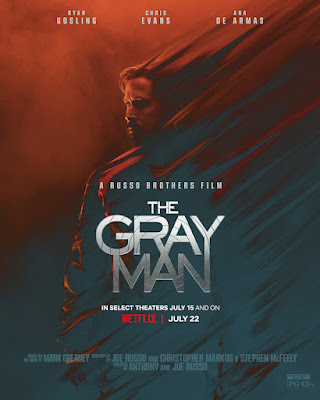Once upon a time, I saw all the nominees for Best Picture before the Oscar ceremonies. As time as gone by in the last few years, I have become less and less interested in the Awards. The expansion of the Best Picture Category was done to include more popular films and keep audiences coming to the theaters and the TV ceremony, but the effort has largely resulted in the inclusion of more independent, specialized films. Sure this year a couple of big movies have been included, but there are at least three films on the list that would not be there if the category had not been expanded, that very few people know or care about. This film would not be one of those. This is a large scale historical epic that is compelling and deserving of attention, however, in the past it would have stayed contained in the "International/Foreign Film" category. Even beyond that classification, it might have been excluded because it was not a theatrical release. This is a Netflix film that probably got a token theatrical exhibition in order to qualify for awards, in spite of the fact that Netflix's model is almost exclusively streaming.
By waiting to see this, I was lucky enough to find a theater that would play the movie on a big screen because of it's award nominations. People who experience this at home are missing out on a very immersive experience, and probably the whole reason that the story is being told in the first place. The film makers want you to share the horror of war, especially the meat grinder that the European Conflict was in WWI. In the past couple of years, there have been a number on movies that featured the horrors of the trench warfare of WWI: "1917", "They Shall Not Grow Old", even "Wonder Woman", "The King's Man" and "Death on the Nile". All war is horrible, but the environment and conditions in this first of the modern wars was particularly brutal.
It has been almost a hundred years since the first version of this story was brought to the screen. It is not as visually brutal as the new film is, but it was emotionally powerful nonetheless because of our ability to empathize with the young men who had excitedly volunteered for the war. Their disillusionment does not take long, and in this modern version it is accompanied by extreme fear, violent dismemberment, and the gruesome duty of collecting the bottom part of the dead soldiers dog tags, as a way of inventorying the casualties. One element I did not remember from the 1930 film, is the negotiations for a ceasefire and the insistent resistance of some of the German general staff to making such an arrangement. Neither side was able to achieve a military victory, but the war of attrition took a toll on the homefront, which is largely ignored in this story.
The structure of the film is roughly the same, as we follow the schoolfriends from enlistment to battlefield. The local politics from the first film, where a postman becomes an authority and abuses his power, is missing from this version. The relationship between the veteran Katczinsky and the newbie Paul is developed substantially, and there is a well told moment when the two men share a latrine, where we see that each of them has something that is being lost by the continuation of the war. The final resolution of their friendship occurs not in combat but in the sort of savaging that is typical of a war and with an unlikely antagonist being responsible for the end. I'm not sure if this expansion of the dangers of war improves the film's message or dilutes it.
Production design on the film feels authentic, with the trenches being a miserable puddle for most of the time the soldiers occupy them, and the bunkers being a claustrophobic nightmare, especially with the arrival of tanks on the front, One of the memorable segments from each film is the period when Paul is trapped in an artillery crater, with a French soldier he has brutally overcome, but who takes so long to die that Paul apologizes, attempts to rectify and then suffers from guilt by the experience. The one famous moment from the 1930 film, which ends the story, is not present in this film. Instead we get an end card that totals up the dead, measures it by the territory gained and losses, and makes a final case for the futility of war through the text rather than the visual.
"All Quiet on the Western Front" may be a more difficult film for American audiences because of the use of German and French. The authenticity is meritorious, but the need to read the words does add a layer to the experience that can distance the emotional investment we make with the soldiers. It is not the sude of the war that they are on, or their cultural differences that might impede us, it is simply the fact that we may not be as in synch with each moment as we might be if it were in our own language. Still, I mourn for Kat, Tjaden, Franz, Albert and Paul, for the humanity that they lost and the needless sacrifice that they made.


